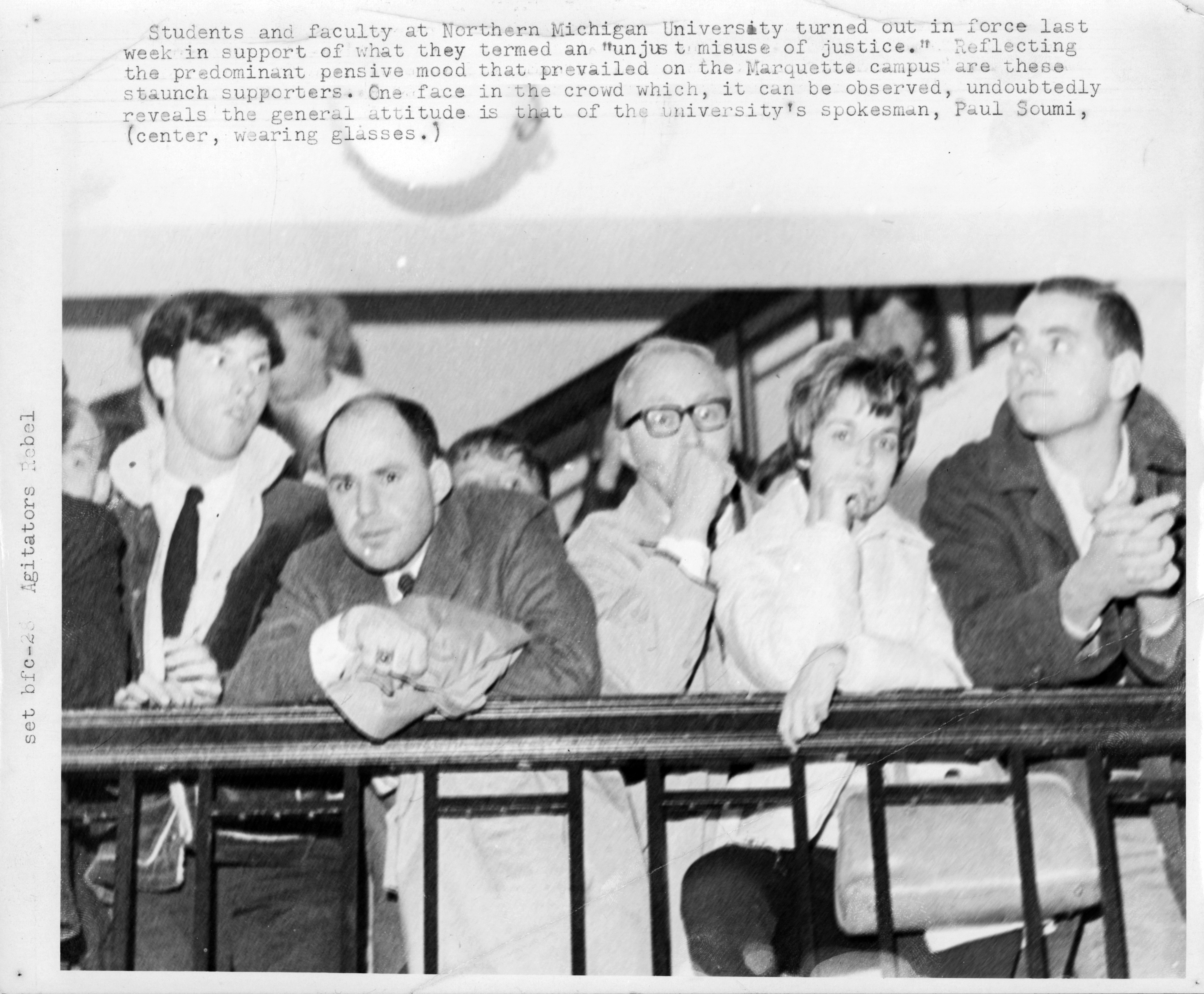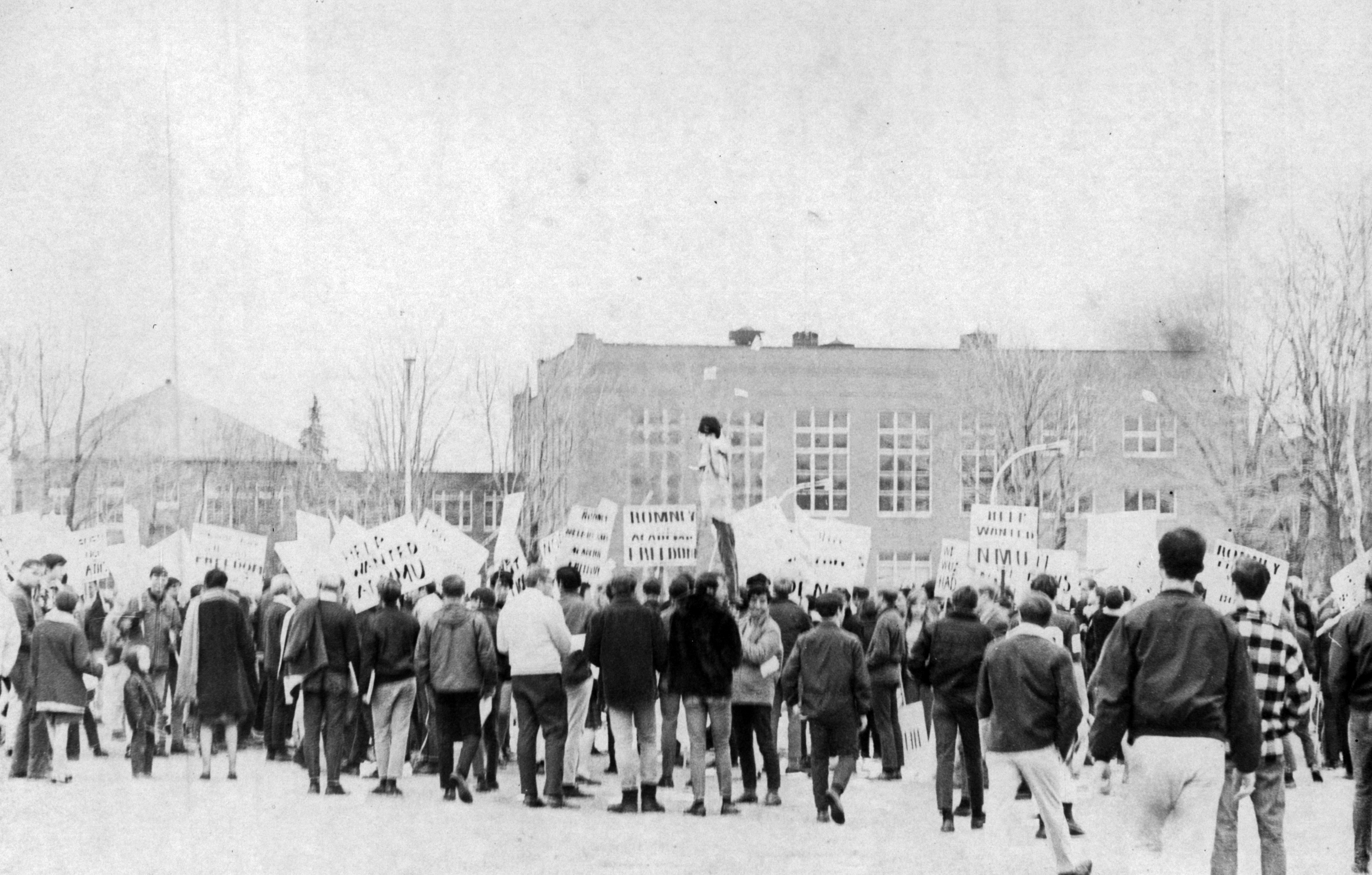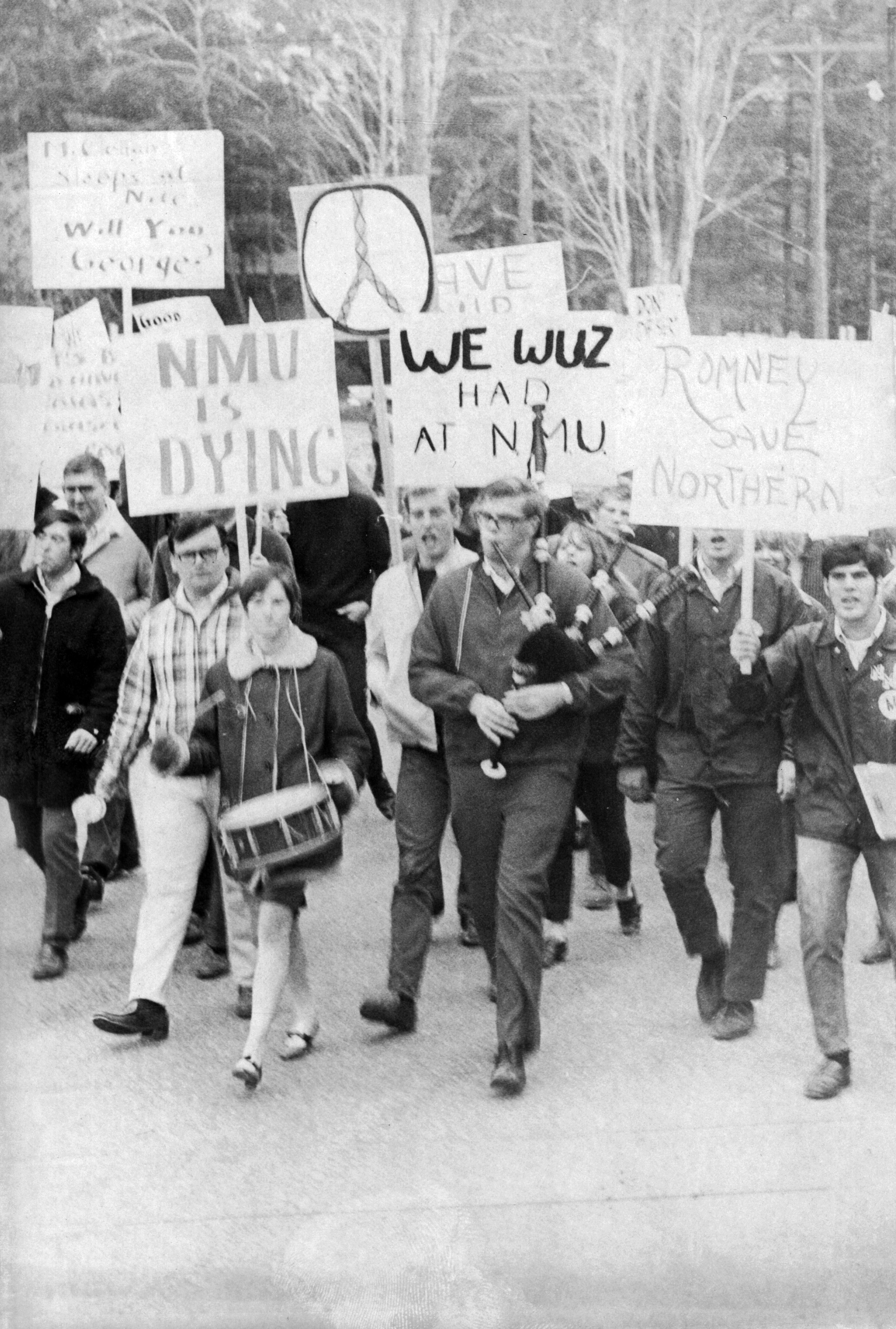The McClellan Controversy (Continued)
1967-1968
McClellan Week
At the Hedgcock Fieldhouse demonstration, Keskey asked each student to act on his own conscience, but suggested a week of protest, after which everyone would resume their normal activities to show that they were responsible students. Keskey told the Northern News that his goal was not simply to get students excited about the cause but to channel their energy in an orderly fashion because otherwise “there [was] a chance that they would become an angry mob which [would lead] to nothing but irresponsible and destructive activity” while organized protest would demonstrate “the sincerity of our cause.”
Pete Fogo, another SGA officer, presented a seventeen point plan of protest for the next week:
- Public parade and demonstration through the streets of Marquette on Wednesday and possibly Friday
- Burning in effigy of Johnson, Harden, and the Board of Control
- Demonstration on Saturday followed by fundraising dance
- “Trick or Treat for Academic Freedom” on Halloween to raise funds
- A sky diver sometime during the week on campus
- A sound truck to circulate around Marquette and campus to inform people about the facts of McClellan’s firing
- Boycott of classes
- Boycott of bookstore, Charcoal Room, and Wildcat Den (cafeteria)
- Library day and read-in
- A motorcade with signs
- Information centers to distribute literature throughout Marquette
- Ask the admissions office to send their transcripts to other schools
- An “eat-in, eat-out” in which students will all go to the cafeteria at the same time one day and none go the next day
- A “love-out” on Sugarloaf on Sunday
- A funeral for academic freedom
- A “burn-in” of university bulletins, catalogues, and other “vulgar propaganda,” but no textbooks
- A “teach-out” involving holding classes or other academic events off campus to replace boycotted classes
The next day, a group of students, faculty, and local Marquette citizens gathered at Saint Paul’s Episcopal Church to “express their concern over the violation of due process and academic freedom.” They ended up forming a group entitled “The Committee for the Defense of Academic Freedom” (CDAF) and stated that their goal was “to publicize the circumstances under which Dr. McClellan was dismissed, to demonstrate how these circumstances are inconsistent with the principles of freedom, and to rebuild Northern after the shattering blow administered by Dr. Harden to the University which he has done so much to build…A vibrant, educating, aware university does not suppress but rather invites controversy. The future of Northern is at stake.” They officially declared the week of October 30 to be McClellan Week.
According to some sources, only ten to fifty percent of students attended classes during the next week, with attendance lowest in history and English classes. However, reports on class attendance varied depending on who was reporting the numbers. Unsurprisingly, the administration gave lower absence numbers than the faculty did. On Tuesday of McClellan Week, Ernest Mazey, head of the Michigan chapter of the ACLU, visited Marquette and spoke to the CDAF. Notably, he called McClellan’s firing “one of the most flagrant violations of due process and academic freedom” that the ACLU had ever seen. That phrase soon became a central one to the protesters. On the Saturday concluding McClellan week, a group of at least twenty-five students and faculty drove to Lansing to protest at the capitol building and to meet with state legislators. They tried unsuccessfully to meet with the governor himself by protesting at his home.
In response to McClellan Week, several state legislators threatened to close Northern, particularly when they learned that some windows had been broken and one state car had been set on fire over the course of the week. However, they did not carry out their threats.
McClellan described his reaction to McClellan week and the overall protests in an interview:
I think they were crazy. I was overwhelmed. One time I was…walking home from school…after my afternoon class and there were a bunch of people walking down the street—students. And I remember I recognized a couple of faculty, in particular Dutch Barnard…There was Dutch in front of the parade carrying one end of a large sign which read “Thoreau Lives”. Okay? And honest to God, this is no exaggeration, I didn’t know what was going on. I didn’t know what they were marching for…I said, what was the reference?...And I said, Dutch, what the hell is going on? And he said, well, we’re demonstrating for you, dummy, what do you mean what’s going on? And I get a little choked up when I think about it because I figured if people were willing to come forward like that then I had to hang in there. So I didn’t go looking for another job, because the ACLU explained to me, they said, “Look, if you leave you don’t have a case. The only way you have a case is if you are quote, damaged, end quote….You can’t sue anybody until you have been fired. And you haven’t been fired as long as you’re being paid.” So what had to happen was: I had to go forward, my job had to end, which it did….
It makes me feel a little funny every time I think about it. That and the student meeting. You know, it was in the old gym, and the gym was packed and I didn’t know what was going on. Someone said, “The students are meeting and we want you to come.” And I said, “Okay, but, you know, for what?” And it was in McClellan Week and they had a fundraiser, that was the purpose. And they wanted me to say a few things. So I got up and talked about academic freedom, and, you know, the usual stuff. And then they passed the hat. And when the money was counted at the end…they raised thousands of dollars. And these are just kids, coming to the meeting with a few bucks in their pocket. I couldn’t get over it. I mean, that kind of support—I had to hang in there.
Marquette Community Response to McClellan Week
The local Marquette community soon blew events far out of proportion. Many soon became convinced that student protests on this scale meant that there had been a Communist infiltration. A woman in Ishpeming wrote in an editorial entitled “Red Infiltration,”
Mrs. Jackie LeVeque of Munising and Jack Dell Angelo of Ishpeming Chamber of Commerce showed their concern Oct. 31 about the insidious evil of communism and its infiltration into all walks of American life. We agree freedom of speech and right of dissent must not undermine unity of our nation or aid and abet the enemy.
The American Civil Liberties Union in our area is NOT truly American. It does NOT assist the Defenders of American Liberties….”Academic” freedom in the streets without respect or restraint is no substitute for freedom of speech in the classroom or legal procedure in our courts. One history professor admitted the “radicals” on campus might get the upper hand. Any majority in our republic is not necessarily right.
It is deplorable that students in general are so naïve in regard to communism. They show great lack of training in this field and little patriotism. “The Communist Party wants social unrest, turmoil, and demonstrations.” reports the FBI. Puppets are used to spark great confusion on university campuses and protests against American policy in Vietnam. Any situation is an excuse for subversive action. Freedom becomes license in the mob which entices students to ignore customary procedure.
The Lewis-Bruce report quotes party leader Gus Hall: “Take advantage of the WILLINGNESS of non-Communists to ACCEPT THE PRESENCE of Communists in their midst.” Is this why students say heatedly, “Even a Communist is entitled to academic freedom?” We think the battle in Vietnam should begin at home on campus. Isn’t academic freedom allowing students to PROTECT our enemies while the boys in Vietnam are dying for AMERICAN freedom without a tag?"
Many others began to jump on the Communist hunt bandwagon. One man wrote an editorial to the Mining Journal in which he complained that students were not protesting against “meaningless curriculum” but against “the institution of AUTHORITY! "And strange as it seems, the pseudo-intellectuals hail these students’ uprisings as signs of progress and scholastic maturity. Yet, how far this idea is from the actual truth. For instance, recall what took place in Berkeley, Calif. not so long ago. Radicalism was the keynote of the day: anti-American, leftist spirit took charge on campus grounds. This is but one example of what extremes the proponents of ‘academic freedom’ are capable of.”
Another commented, “Despite the smokescreen set up by the SGA and some of the faculty, the facts remain obvious. The board of control should do just that—control. The faculty should teach. Criticizing the administration is not teaching, no matter how much you stretch it.” One woman actually wrote that those “concerned and puzzled” about “goings-on” at Northern should read a book called “Masters of Deceit” by J. Edgar Hoover, in particular chapters entitled “Communist Strategy and Tactics,” “Mass Agitation,” and “Infiltration.” She urged people to “read this book carefully and WAKE UP!”
Yet another local writer commented that “if these students carry a grudge and harbor a rebellious attitude, maybe Vietnam would cure them—seeing as how they are deferred for educational purposes. It appears to me they have a lot of guts to even show their face—it should be in a book. The only thing about higher education seems to be the cost; intelligence is just something they consider.”
Still others complained that their tax dollars were going “to further revolt against authority and to finance the antics of bearded, shaggy men and string-haired females who go to a school just to instigate trouble and try to force communism on us.”
Other local community members, however, warned against those who were too quick to term all protests as “communist” and stressed that students questioning decisions that they believed were unjust was in fact a “valuable and well-established American tradition.”






